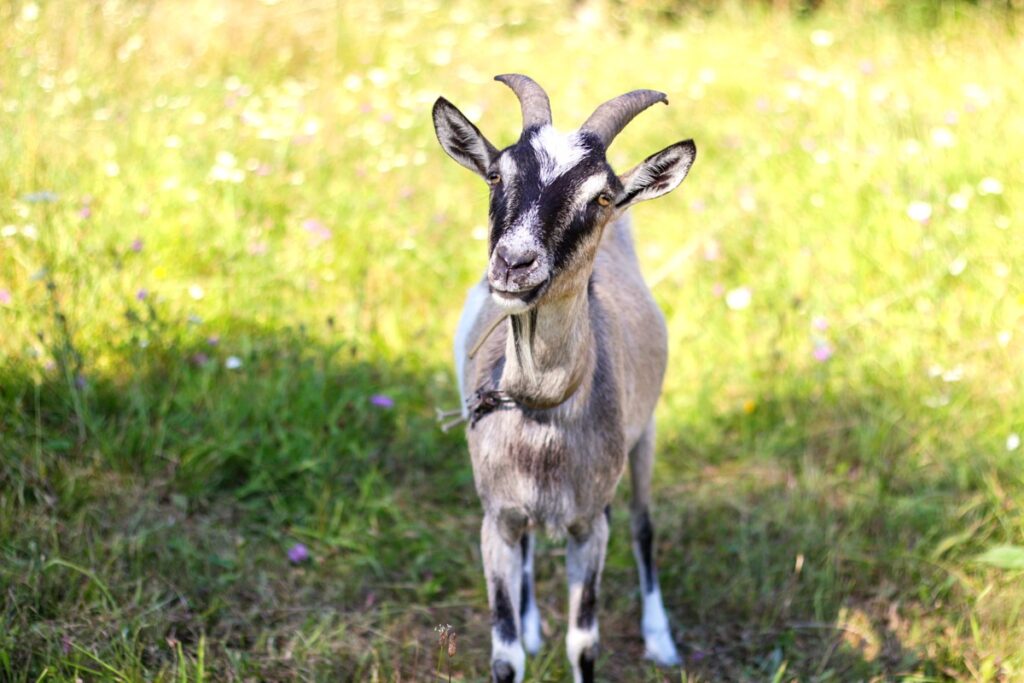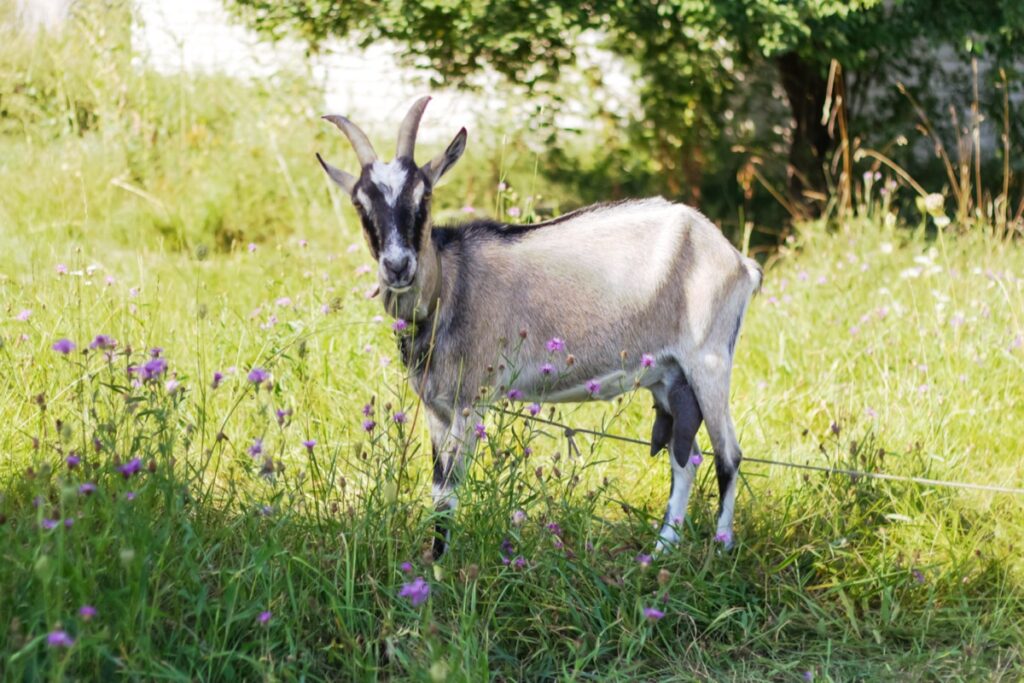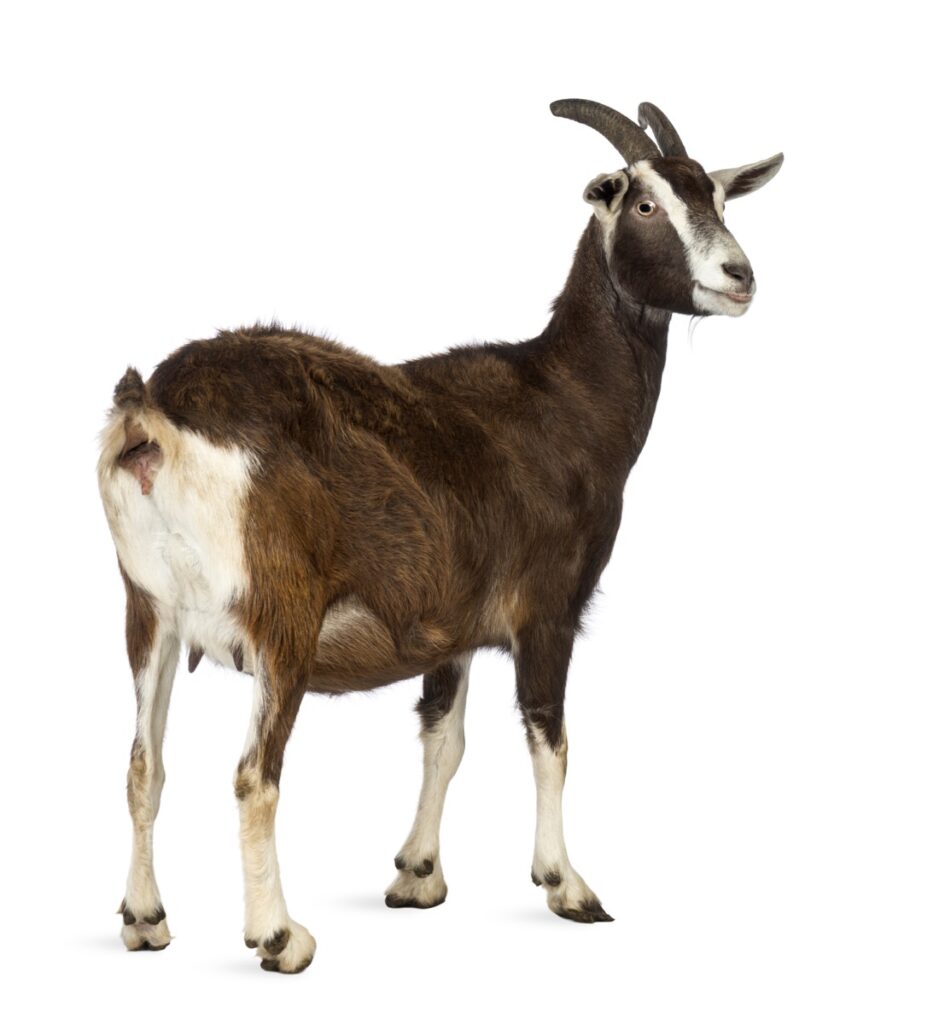The Toggenburg is a dairy goat breed that has gained popularity worldwide. These goats have become a farmer’s favorite because of their distinct appearance and exceptional milk production capabilities. Toggenburg goats are versatile creatures with multiple uses on a farm – whether you desire high-quality milk or seek opportunities in meat production.

Toggenburg Goat Characteristics
- One of their most noticeable features is their medium to large size. These goats have a sturdy build and well-developed muscles, allowing them to adapt well to various climates and terrains.
- Another distinguishing characteristic of Toggenburg goats is their erect ears, which give them an alert appearance. They also have a straight or slightly dished face profile and expressive eyes.
- Toggenburgs are known for being excellent producers. The milk has a high butterfat content, making it ideal for producing delicious cheese and other dairy products.
- Toggenburgs also possess gentle temperaments. They are generally calm and easy-going animals, which makes them suitable for both commercial farms as well as small-scale operations.
Toggenburg Goat Origin
Toggenburg goat is a breed of dairy goat originating in the Toggenburg valley of Switzerland. This breed has a rich history is considered one of the oldest known dairy goat breeds.
Toggenburg Goat Milk Production
- These goats are known for being excellent dairy animals, providing farmers with a steady supply of nutritious and delicious milk.
- Additionally, Toggenburg goat milk is known for its high protein content.
- Furthermore, Toggenburg goats are efficient producers of milk. They can produce between 1 to 3 liters of milk per day. This consistent output makes them reliable sources of dairy products for both small-scale and commercial farmers.
Toggenburg Goat Weight
- The male Toggenburg goats typically weigh between 68-91 kg, while the females are slightly lighter at around 55 kg.
- This difference in weight can be attributed to various factors like genetics, diet, and overall health. Proper nutrition ensures that male and female Toggenburg goats reach their ideal weight.
- Goat farmers need to monitor the growth and development of their animals closely.
- Maintaining an optimal weight is essential for the overall well-being of these dairy goats.
Facts About Toggenburg Goats
| Breed Name | Toggenburg |
| Breed Size | Medium |
| Weight | Buck – About 68-91 kgDoe – At least 55 kg |
| Horns | No |
| Climate Tolerance | All Climates |
| Coat Color | Light fawn to dark chocolate |
| Rarity | Common |
| Country/Place of Origin | Switzerland |
Housing and Fencing for Toggenburg Goat Farming
- You’ll want to provide your Toggenburg goats with a safe and secure environment. This means having sturdy fencing that can withstand their curious nature and prevent them from escaping.
- A good rule of thumb is fencing at least 4 feet high, as Toggenburg goats are known for being agile jumpers. It’s also important to ensure that the gaps in the fence are small enough to prevent them from getting stuck or injured.
- It’s important to regularly check your fences for any signs of wear or damage. Regular maintenance will help ensure their safety and security on your farm.
- Providing proper housing and fencing for your Toggenburg goats is vital in maintaining their health, well-being, and overall productivity on your farm.
In case you missed it: Technology in Goat Farming: Precision Farming, Automation, Different Types of Sensors

How to Raise Healthy Toggenburg Goats?
- Provide a clean and spacious living environment for your Toggenburg goats. They need adequate space to roam and shelter from extreme weather conditions. Ensure their bedding is regularly cleaned and replaced to prevent the spread of diseases.
- Establish a feeding routine that includes a balanced diet for your goats. Toggenburgs thrive on a diet consisting mainly of fresh grass or hay. Supplement their diet with grains and minerals to meet their nutritional needs.
- Pay close attention to any signs of illness or distress in your goats. Regular check-ups by a veterinarian are essential for early detection of any health issues.
- Practice good hygiene practices on your farm. This includes regular cleaning of water troughs, disinfecting equipment used for milking, and practicing proper sanitation when handling the animals.
Facilities and Supplies Needed for Successful Toggenburg Goat Farming
- To ensure the success of your Toggenburg goat farming venture, it is crucial to provide them with the right facilities and supplies.
- You will need a well-built and secure housing structure for your goats. This should protect them from extreme weather conditions while providing sufficient space to move around comfortably.
- Investing in proper feeding equipment, such as hay racks and water troughs, is vital. These supplies help maintain hygiene standards and ensure your goats can access fresh food and water.
- Furthermore, providing adequate ventilation within the housing facility is important for preventing respiratory issues among your goats. Good airflow helps keep their environment clean and reduces the risk of spreading diseases.
Feeding and Nutrition for Toggenburg Goats
- Feeding and nutrition play a crucial role in Toggenburg goats’ overall health and productivity. These animals have specific dietary requirements that must be met to thrive.
- A balanced diet is essential for Toggenburg goats, including good quality hay, fresh pasture, and grain or concentrate feed. The hay should be free from mold and dust, while the pasture should provide a variety of vegetation for grazing.
- Toggenburg goats require additional protein, minerals, and vitamins.
- Water is another critical component of their diet. Clean and fresh water should always be available at all times. Goats have high water requirements due to their efficient digestive system.
Health Care and Management Tips for Toggenburg Goats
- Regular veterinary check-ups are essential to detect any potential health issues early on. This can help prevent the diseases and minimize the risk of outbreaks within your herd.
- Proper nutrition is another key aspect of goat health care. A balanced diet rich in vitamins and protein is essential for optimal growth and milk production. Always offer fresh water at all times, as dehydration can be detrimental to their overall health.
- Regular grooming is also important in maintaining healthy Toggenburg goats.
- Maintaining a clean environment is crucial for preventing the spread of diseases among your goats.
- Observe your goats closely for signs of illness or distress, such as loss of appetite, abnormal behavior, or changes in body temperature. Promptly address any concerns by consulting with a veterinarian specializing in goat care.
In case you missed it: Surviving the Heat: The Impact of Climate Change on Goat Farming

Conclusion
The Toggenburg goats have unique characteristics that make them well-suited for milk production. They can be a profitable investment with their high milk yield and ability to thrive in various climates. Toggenburg goat farming presents an opportunity for farmers seeking sustainable income through dairy production.
- Types of Grass Growing for Goat Farm
- How to Train Goats for Milking: A Beginners Guide
- Goat Milking Practices and Equipment: A Beginner’s Guide
- Goat Farming for Fiber: Producing Mohair and Cashmere
- Maximizing Goat Milk Production: Tips for Dairy Goat Farmers
- Goat Farming as a Family Business: Strategies for Success
- Profitable Kenya Goat Breeds for Commercial Dairy and Meat Business
- Unlock the Secrets of Oberhasli Goat: Discover Raising and Management Practices
- Ultimate Guide to Myotonic Goats: Explore Profile to Raising
We need a Toggenburg dairy goat of one year old. Can somebody supply this goat breed. It must be a certificated goat.
Where do i can ask for certificate F1/FB Toggenburg male and female.